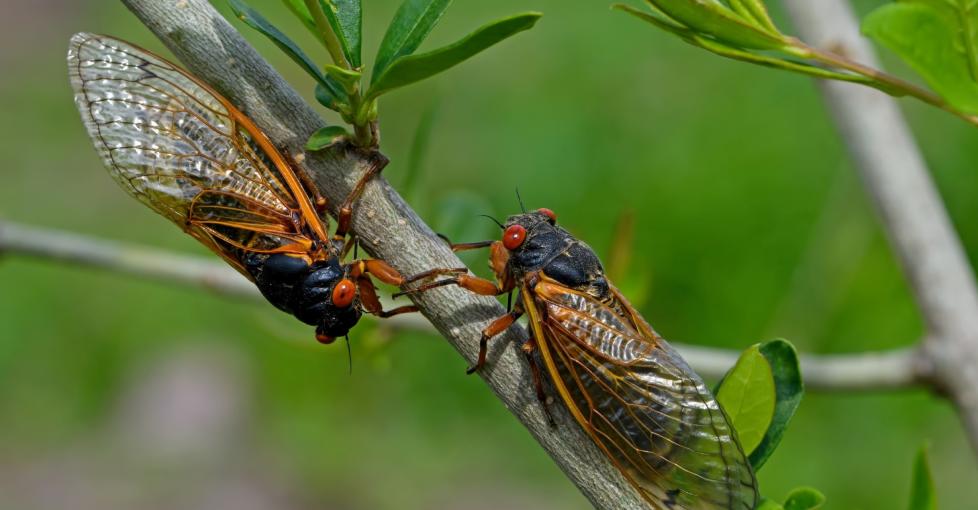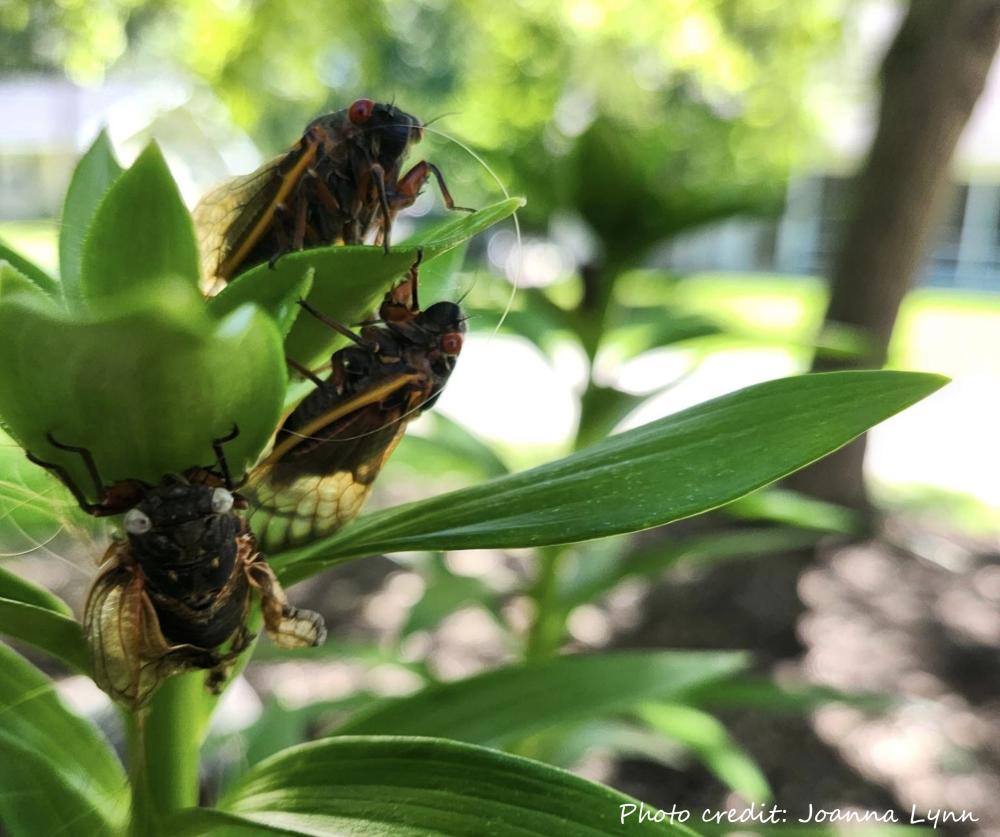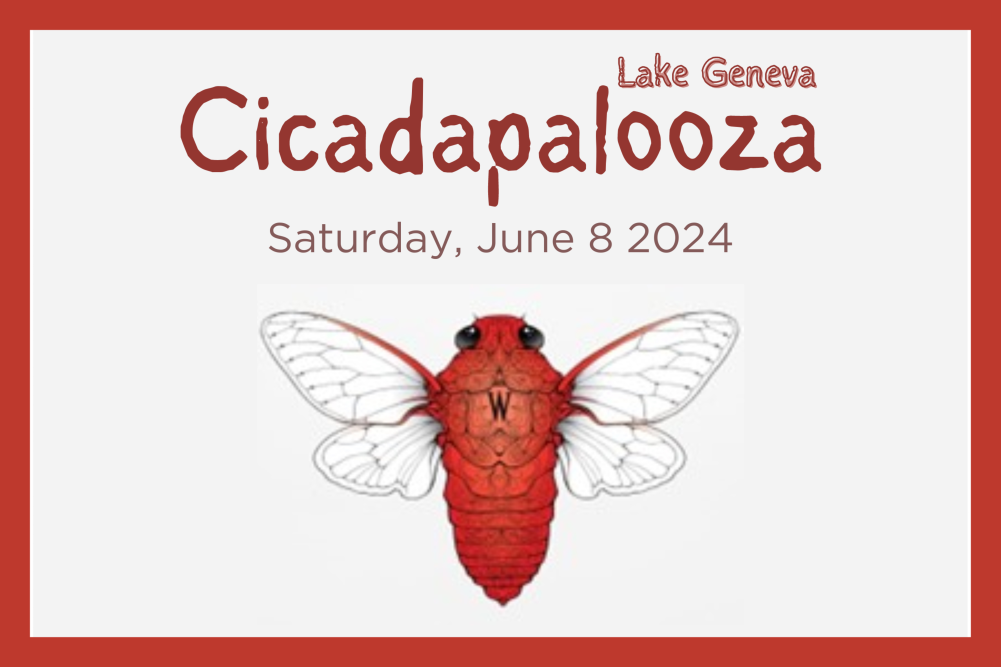
By Stephanie Klett and Bill Barth
Beautiful Lake Geneva – the “Newport of the West” – is known for a lot of wonderful things.
This year that includes bugs.
On June 8, “Cicadapalooza” will turn the community into Wisconsin’s central welcoming committee for a periodic emergence that last happened 221 years ago. Two cicada broods – the 13-year and 17-year varieties – will make a joint appearance that last occurred when Thomas Jefferson was president, the United States was doubling its size with the Louisiana Purchase, and Wisconsin was neither a state nor a territory, but part of the Indiana Territory.
And if you really want to get technical, that 221-year mark is barely a blip in cicada history, with periodic broods diverging around 4 million years ago. Common ancestors of modern cicadas were around to see dinosaurs.
Humans are just the new guys on the block.
Visit Lake Geneva is teaming up with the Lake Geneva Public Library – and the amazing folks at UW-Madison’s Entomology Department – to create a fun and educational event celebrating the quirky life patterns of these interesting insects.
Professor Russ Groves chairs the Entomology Department and specializes in ecology and insect management related to vegetable agriculture. Entomologist PJ Liesch – better known as “Wisconsin’s Bug Guy” – is director of UW’s Insect Diagnostic Lab. We had a delightful conversation with them about all things cicada.
Let’s start with the sexy story about why the cicadas are showing up. They’re here to mate. That loud buzzy noise we’ll be hearing is male cicadas “calling out and identifying potential mates,” Russ told us. Friendly females, he says, snap their wings together in an inviting response and, well, nature does what nature does. These randy adult cicadas wear themselves out mating and laying eggs, then expire after a few weeks. When the eggs hatch – the cicada babies are called nymphs – the bug children burrow underground and attach to tree root systems for sustenance. Something scientists only vaguely understand triggers the broods years later that it’s time to emerge, find mates and start the process all over again.

Cool. So what makes Lake Geneva Bug-Central?
Though not unique, the Lake Geneva region is relatively unspoiled and forested, natural habitats for cicada broods. Russ and PJ point out other places – the northern third of Illinois, along the Mississippi River, Wisconsin’s Driftless Region – that are also quite hospitable for cicadas.
“Lake Geneva has stability of the ecosystem around the lake,” Russ said, “with mature trees and soil that hasn’t been disturbed as much.”
That creates an opportunity for people to be part of something special.
“Here in Wisconsin you are witnessing with your own eyes a really cool natural phenomenon,” PJ said, a dual emergence that will only come around once in several generations. “It’s really neat that the public has interest,” Russ told us, “an appreciation for insects.” And, he said, “It couldn’t come at a better time,” when people need to pay more attention to the human impact on the natural world.
We asked if there are lessons people can learn from this emergence, lessons applicable to surviving in a changing environment. “Insects have been pretty successful, among the longest-lived terrestrials on the planet,” Russ said.
Thinking science-fiction, we asked if that suggests insects will take over the world if we humans manage to blow ourselves up or foul the planet beyond survival. PJ said the meek really might inherit the world, and “It very well could be cockroaches.” We like cicadas better.
Another question: Do these bugs serve a purpose?
“Most bugs have a purpose,” Russ said, “an ecological position of consequence.”
PJ reminds us that cicadas – and other insects – play an important role in the ecosystem and “have a big benefit to wildlife. They’re a great food source, from birds to fish and other land animals that gorge themselves. For cicadas, it’s a big benefit but a short-lived benefit.”
People eat bugs, too, he said, not so much in the United States but in other countries where insects often are on the menu.

Which brings us back to the Cicadapalooza celebration being planned. Yes, it will include the opportunity to consume cicadas. Don’t knock it till you try it.
- Pier 290 in Williams Bay will be serving a cicada-based treat that Executive Chef Ken Hnilo describes as “woodsy.”
- Those who prefer a liquid version can try “Magicicada Buzz” at Topsy Turvy Brewery in downtown Lake Geneva, a Nut Brown Ale with cicada ingredients.
Medical note, from the UW guys: Those with shellfish allergies should exercise caution.
Stephanie is the adventurous one – she’s been known to sample all sorts of weird food concoctions in her earlier travels with Discover Wisconsin and the Wisconsin Department of Tourism – so she’ll likely chomp whatever is offered. Safe bet Bill will stick to the beer.
To our Dear Readers, indulge whatever suits your fancy, from tasting the treats to sitting in on educational talks or doing one of the walking tours to cicada-friendly sites. It all starts around the Lake Geneva Public Library on our beautiful shoreline.
Bug on over – or wait years and years for the next chance.
Stephanie Klett is the President and CEO of Visit Lake Geneva, and the former Secretary of the Wisconsin Department of Tourism. Bill Barth is the former Editor of the Beloit Daily News, and a member of the Wisconsin Newspaper Hall of Fame.


